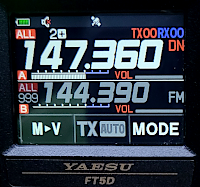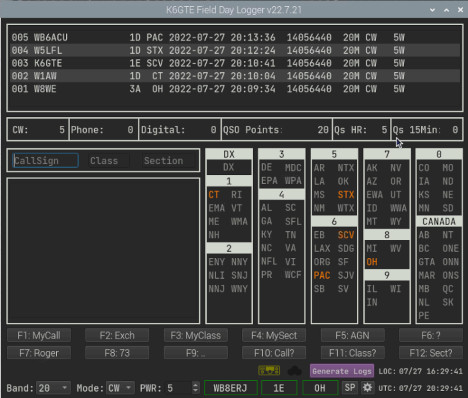 For the first time in several years, I was able to go the the 2023 Dayton Hamvention. If you have ever been, it is perhaps the best hamfest there is. If you did go to the Hamvention, did you get your Yaesu hat? I did – as well as my daughter, KC8GRS, and her two kids. It was a great 3 day event with approximately 35,000 hams present. One of my goals was to purchase a Yaesu FT5DR radio.
For the first time in several years, I was able to go the the 2023 Dayton Hamvention. If you have ever been, it is perhaps the best hamfest there is. If you did go to the Hamvention, did you get your Yaesu hat? I did – as well as my daughter, KC8GRS, and her two kids. It was a great 3 day event with approximately 35,000 hams present. One of my goals was to purchase a Yaesu FT5DR radio.
Bought the FT5DR
So I wanted to pick up a digital radio that supported Yaesu’s System Fusion. After chatting to one of the guys at the Yaesu booth I went straight over to the Ham Radio Outlet booth and bought the Yaesu FT5DR handheld radio. I also bought the RT systems USB-68 cable, but not the software since I don’t really have a Windows computer, except for an old laptop that does dual boot into Windows 7, but I almost always boot into Ubuntu. Since most of my computers are now Linux based, so the software that they provide won’t work anyway. Instead I use the Chirp program for my radios.
CT68 cable not working
After I got home and started looking at my shiny new Yaesu FT5DR, I quickly found out, that Chirp can’t see the CT68 cable! So the first thing I did was open up a terminal window, and issued lsusb to see if Ubuntu can see the device. Sure enough, as you can see in the screenshot below, its there!

But when I type ls /dev/ttyUSB* it doesn’t show as being available as shown below:

My first thought was that I had a defective CT68 cable. But then I remembered that I had my old linux laptop with Windows 7. I was able to put an old version of Chirp on it on the Windows 7 side, and sure enough I was able to program my FT5DR radio. But the old version wouldn’t let me program the radio for digital modes.
 I have been searching for a Field Day logging program for a couple of years that works on a
I have been searching for a Field Day logging program for a couple of years that works on a 
 The other day I needed to reset the root password for a mysql database because I forgot it (oops!). Fortunately, there is a simple solution to resetting root password in mysql.
The other day I needed to reset the root password for a mysql database because I forgot it (oops!). Fortunately, there is a simple solution to resetting root password in mysql. Recently on one of my Ubuntu servers, I needed to delete files that were older than a week. As a general rule, this is good practice for files that you may need but after a while you won’t need them. In my case, I only needed them for at most, a week. Here is how I did it:
Recently on one of my Ubuntu servers, I needed to delete files that were older than a week. As a general rule, this is good practice for files that you may need but after a while you won’t need them. In my case, I only needed them for at most, a week. Here is how I did it: Recently I needed to copy a file using scp to another server and encountered the following error: “scp: ambiguous target” In doing some testing I figured out that the space in the file name was the problem. Here is how to handle a file name with a space in it.
Recently I needed to copy a file using scp to another server and encountered the following error: “scp: ambiguous target” In doing some testing I figured out that the space in the file name was the problem. Here is how to handle a file name with a space in it.